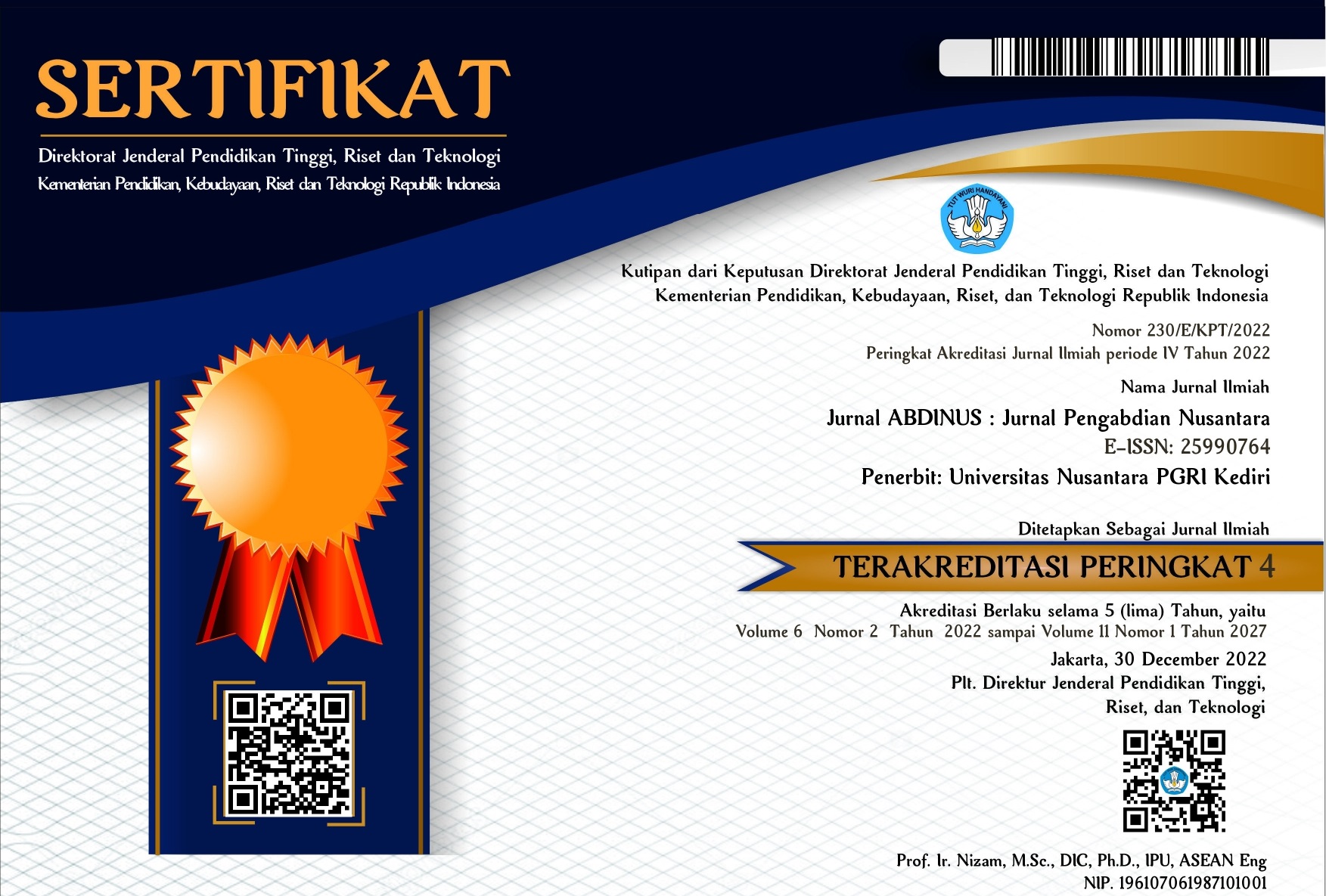Program Kawasan Ramah Ibu Hamil sebagai Upaya Preventif untuk Mengurangi Kecenderungan Psychological Distress
DOI:
https://doi.org/10.29407/ja.v8i1.21452Keywords:
Pregnant women, Community intervention, Psychological distressAbstract
Pregnant women are vulnerable to problems that can create high stress and have a negative impact on their emotions. The desire to be a good and perfect mother can cause pregnant women to face a number of problems or what is called psychological distress. Therefore, immediate solutions are needed to reduce high levels of stress which cause psychological pressure and play an important role in preventive efforts in reducing various types of psychological disorders. This service program aims to provide more knowledge related to the problems of pregnant women and be able to provide mutual support among the surrounding community so that serious problems are minimized and the community can become a good forum for its citizens to exchange ideas and share stories. This preventive service program is provided through providing psychoeducation, discussion, relaxation training, role play and evaluation. The results of the service program show that there is a significant difference in the average psychological distress score between before and after the intervention with a value of p = 0.004 (p < 0.05). The post-test average score of 23.1 is lower than the pre-test average score of 38.3. This means that the intervention provided can reduce the level of psychological distress in pregnant women.
Downloads
References
Bennett, H. A., Boon, H. S., Romans, S. E., Grootendorst, P. (2007). Becoming the best mom that I can:women's experiences of managing depression during pregnancy a qualitative study. BMC Women's Health. 7,13. https://doi.org/10.1186/1472-6874-7-13
Doherty, D. T., Moran, R., Kartalova-O’Doherty, Y. (2008). Psychological distress, mental health problems and use of health services in Ireland. Dublin: Health Research Board. https://www.lenus.ie/handle/10147/336104
Gavin, N. I., Gaynes, B. N., Lohr, K. N., Meltzer-Brody, S., Gartlehner, G., Swinson, T. (2005). Perinatal depression:a systematic review of prevalence and incidence. Obstet. Gynecol. 106,1071–1083. https://doi.org/10.1097/01.aog.0000183597.31630.db
Guardino, C. M., & Schetter, C. D. 2014. Understanding Pregnancy Anxiety. Zero To Three: University of California. https://eric.ed.gov/?id=EJ1125704
Hodgkinson, E. L., Smith, D. M., Wittkowski, A., (2014). Women's experiences of their pregnancy and postpartum body image: a systematic review and meta- synthesis. BMC Pregnancy Childbirth 14, 330. http://dx.doi.org/10.1186/1471- 2393-14-330.
Pop, V. J. M., Boekhorst, M. G. B. M., Deneer, R., Oei, G., Endendijk, J. J., Kop, W. J. (2022) Psychological distress during pregnancy and the development of pregnancy-induced hypertension: a prospective study. Psychosom Med. 84(4):446–56. https://doi.org/10.1097/psy.0000000000001050
Rubertsson, C., Hellström, J., Cross, M., Sydsjö, G. (2014). Anxiety in early pregnancy: prevalence and contributing factors. Arch Women's Ment Health. 17,221–228. https://doi.org/10.1007/s00737-013-0409-0
Staneva, A., Bogossian, F., Wittkowski, A. (2015). The experience of psychological distress, depression, and anxiety during pregnancy: A meta-synthesis of qualitative research. Midwifery (31) 563–573. https://doi.org/10.1016/j.midw.2015.03.015
Suristyawati. P., Yuliari. S. A. M., dan Suta. I. B. P. (2019). Meditasi untuk Mengatasi Kecemasan. E-Jurnal Widya Kesehatan 1 (2). https://doi.org/10.32795/widyakesehatan.v1i2.461
Yuksel, F., Aki, N. S., Durna, Z., (2010). Prenatal distress in Turkish pregnant women and factors associated with maternal prenatal distress. https://doi.org/10.1111/j.1365-2702.2012.04283.x















